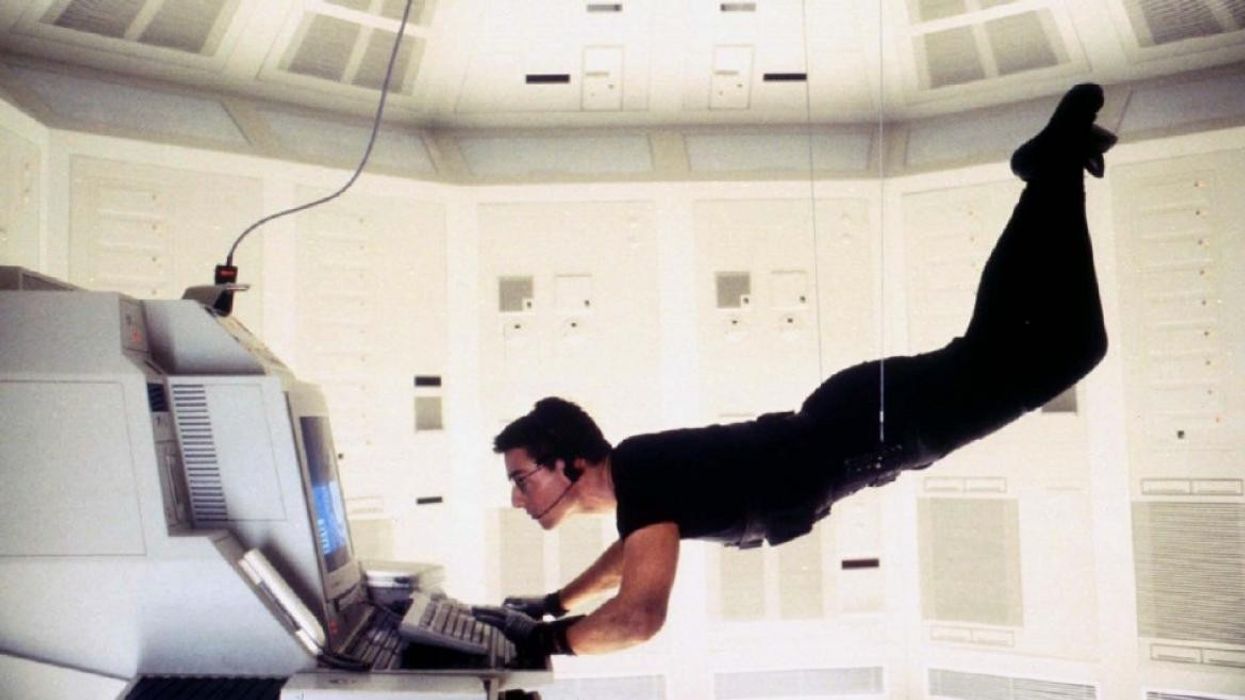Watch: The Secret to the Success of 'Mission Impossible' is Not Just Tom Cruise's Stunts
Mission Impossible: Fallout and its storied franchise masterfully use heist movie conventions to drive story.

As Michael Tucker of Lessons from the Screenplay admits at the start of this video, the release of every new Mission Impossible film is accompanied by lots of buzz about whatever new and "crazy, incredibly dangerous" stunts Tom Cruise has undertaken without the use of doubles (the latest film features a HALO jump from over 25 thousand feet.) And though these high-flying shenanigans might come across as a way for an adrenaline junkie to get his jollies while being paid a great of deal money—and to cause one to see the films as mere "flashy action movies"—the secret of the MI franchise, according to Tucker's latest video, is that it's actually made up of a series of heist films. Read on to see how the filmmakers employ this genre, and how it helps drive the stories forward.
The Goal
At the heart of every story, regardless of genre, lies a desire. Without a desire for something, nothing would happen. And, as Hitchcock demonstrated with his instructive anecdote about the MacGuffin, a desire or goal that sets a plot in motion need not have much to do with anything outside of itself. The MacGuffin can be anything, and in the two films under consideration here, the 1995 reboot of the '60s TV series, and 2015's Rogue Nation, it's lists.
In the first film, Ethan Hunt wants to find the "NOC list" (which contains the names of many super secret agents), and in Rogue Nation, it's a list of all the bad guys on the planet, complete with their home addresses, star sign and favorite food. Either way, in both films, the needed lists are locked up in super secure locations, meaning that "the protagonist is going to need allies, or, in this case, a team." And what is a heist movie, I ask, that lacks a team? A film about a lonely burglar, that's what, and while that sounds like a good idea for a movie, a heist picture it is not.
"Perhaps more than any other kind of sequence, heists present the hero with an incredibly clear-cut goal and difficult obstacles."
The Team
The hero's desire requires the creation of a team, and the creation of the team creates the opportunity for the writers to "tease some of the obstacles our heroes will be going up against," as the new characters, each with a different skill set that they will bring to the heist, are introduced. During this team-building sequence, the writers also build tension, and according to Tucker, one way they do this is by telegraphing that one of the team members is a "false ally," the term used by screenwriting guru John Truby. Tucker quotes Truby on the subject of this no-good fake friend, saying that this character is a way to, "add power to the opposition and twists to the plot."
Another tension building element of this part of both MI films is that the newest members of the team are both wild cards, ex-agents who may or may not be trustworthy. Unfortunately for Cruise, though, "He has no choice. He's going to need their help if he wants to achieve his desire, because standing in their way are a number of obstacles." And how. Which brings us to the next phase of the operation.
The Obstacles
As defined by Tucker, "obstacles are the forces of antagonism that the heroes struggle against. They are what creates drama...[and] once the team has been gathered, both films waste no time in establishing the difficulty of the mission they're about to attempt." In fact, one could say, if one were a pessimist, that this mission would be, perhaps, impossible, but obviously this is not the case, or at least, no one dares to think so, mostly because of the extreme need to possess those precious lists. And throughout the films, the writers have been careful to set up the precariousness of the situations they will be walking into, weaving the exposition into narration and giving us a guided tour of the dangers they will eventually face (see Tucker's video for examples of these sequences).
There's more to it, of course, and the video goes into depth about how the films of the franchise differ from each other, in furtherance of the same goal. In doing so, he makes good points about the skillful ways these films are using the tropes of the heist genre in order to achieve their storytelling goals. As Tucker puts it, "perhaps more than any other kind of sequence, heists present the hero with an incredibly clear-cut goal and difficult obstacles, creating high stakes scenes [that are] designed to keep the audience guessing."
Source: Lessons from the Screenplay











